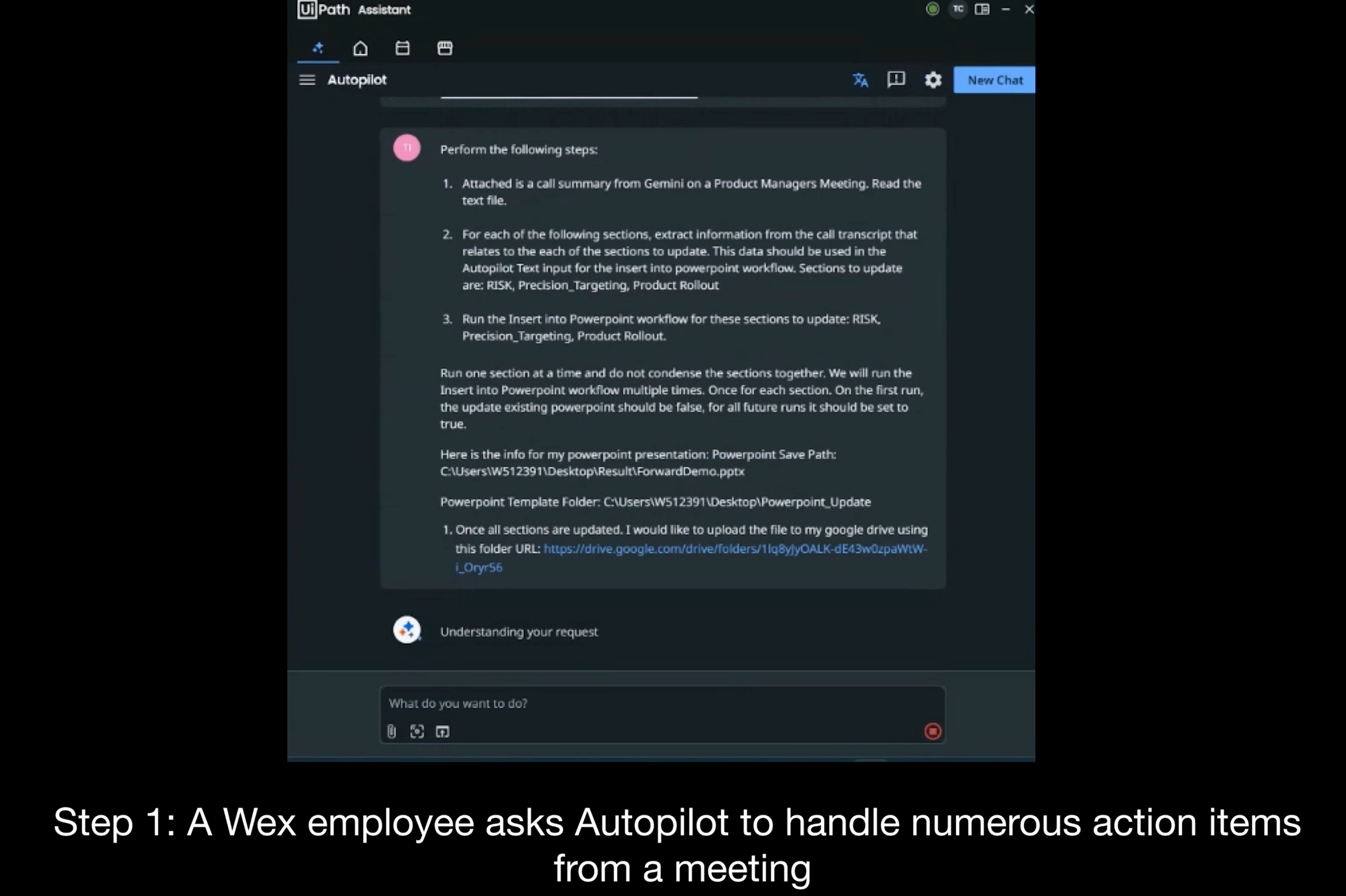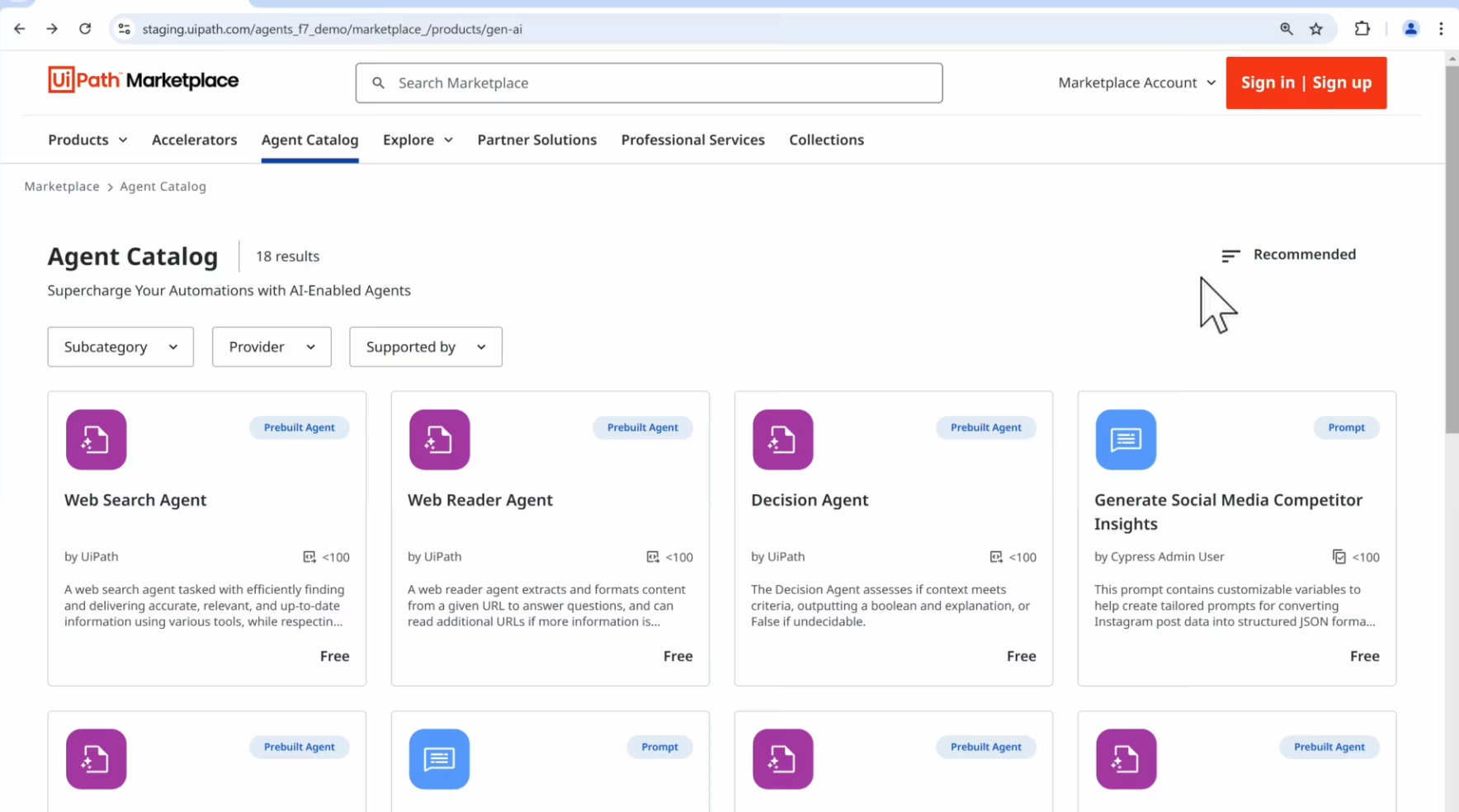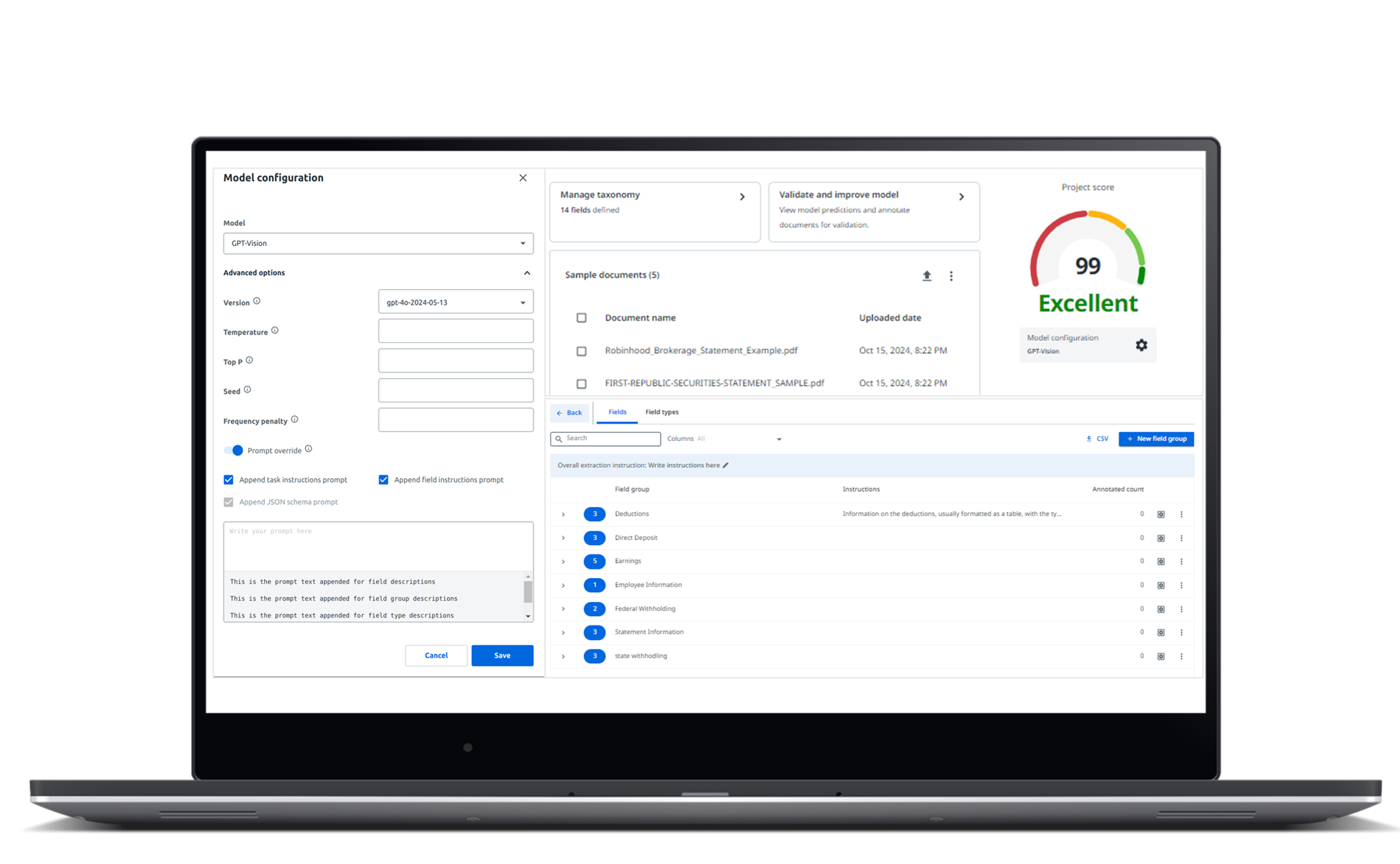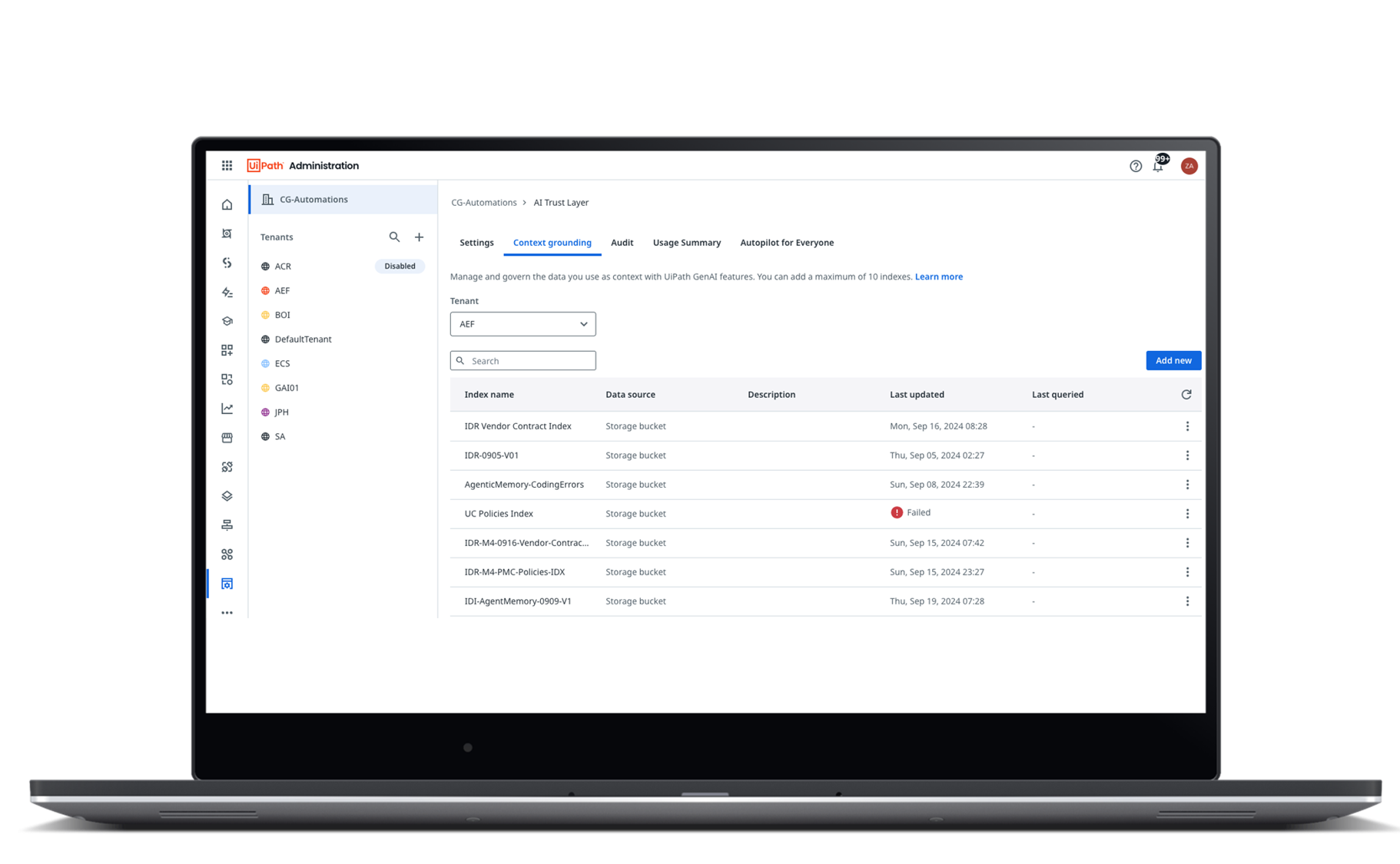The future of the UiPath Platform is agentic and robotic
Share at:

This year at UiPath FORWARD, our CEO, Daniel Dines, set forth a bold new vision for the company: to build on our foundation as the world’s leading automation platform to become the leader in agentic automation. This is not just a set of incremental improvements. We are on the cusp of a productivity revolution that rivals the advent of PCs and the internet. I am excited to share with you the key product proof points and the roadmap that will help every customer realize true AI transformation in the agentic future with UiPath.
The agentic automation imperative
UiPath customers, including this year’s AI25 award winners, have realized significant value through AI and automation. However, businesses continue to face substantial challenges in driving AI transformation, especially when dealing with complex work across multiple systems. Many have yet to see the promised productivity gains materialize and don’t trust AI on their most critical enterprise processes.
A new era of agentic automation is going to address these challenges. This innovative approach combines the best of agents to do non-deterministic goal-based work, robots to do deterministic rules-based work, and people to take the most critical decisions - enabling them to work together to automate the majority of enterprise processes.
Here are some highlights of our most important AI product releases from the last year and what’s coming in the next few months:
UiPath Autopilot™ for Everyone: Our first conversational agent
There’s still huge data and technology fragmentation across the business landscape. An influx of AI tools has only added to the burden on employees, giving them more capabilities to learn, manage and integrate. That’s why we’ve released Autopilot for Everyone, our first conversational agent. Autopilot empowers every employee—regardless of technical ability, department, and level—to easily automate their daily tasks and be more productive.
Just like how real work gets done, Autopilot works across all your applications, including Mac and Windows platforms, Microsoft Outlook, Teams, Slack, Salesforce, and ServiceNow. Autopilot utilizes existing automations in the UiPath Platform™ to execute processes with minimal human intervention. It processes digital documents, copies digital content, and transforms the data on your behalf. But what makes Autopilot really powerful is the ability for users to ground it in their business data with context grounding to deliver reliable, accurate outputs.

On the main stage of UiPath FORWARD, I shared live demos and implementations of Autopilot from several customers. For example, Wex uses Autopilot as part of its strategy to empower and improve the employee experience. With Autopilot, employees can now analyze meeting transcripts to automatically generate a list of action items for their leaders—along with proactively identifying delivery risks from those conversations. Autopilot is a productivity force multiplier, helping Wex employees to reduce manual work and quickly brief their leadership teams.
Enterprises can easily customize Autopilot just as Wex and our other Autopilot customers have done. Users can give instructions to Autopilot to modify its outputs and Autopilot will learn how they work over time. Enterprises can also easily govern their rollout by choosing what data sources Autopilot pulls from, customizing its user interface, and deciding what automations it can run.
Autopilot for Everyone is free to get started for existing Automation Cloud enterprise customers. Read more about Autopilot for Everyone here.
UiPath Agent Builder: Build the best enterprise agents for your business
Enterprises have started to build and adopt AI solutions that perform specific tasks reactively and under close supervision. The next chapter for AI is proactive agents able to work alongside people and with less need for handholding. Crucially, these need to be high-quality, trusted enterprise agents that are reliably grounded in their business context.
That’s why we have created UiPath Agent Builder, which has just entered private preview this week! Agent Builder is a low-code, easy-to-use agent development tool available in UiPath Studio. It will help developers create, customize, evaluate, and deploy specialized enterprise agents they can trust to work independently in their organization. UiPath Agents created in Agent Builder can be confidently deployed to existing workflows or customers can create entirely new agent-based workflows using our new agentic enterprise framework.
Agents are only as good as the tools they have to take action. Specialized enterprise agents from UiPath have the best tools, including the full depth and breadth of the UiPath platform for API automation, UI automation, IDP, and long-running multi-step workflows. UiPath is vendor agnostic and will support a wide variety of models and agent ecosystems. We also provide native escalation for humans in the loop in addition to the ability to monitor and manage actions in Action Center. UiPath will orchestrate these enterprise agents along with robots and humans in complex, end-to-end business processes to ensure the highest level of accuracy, reliability, governance and trust.

Users can get a head start on their agent development by using our agent templates—prebuilt, evaluated agents curated by UiPath to perform a specific role or process. These contain a starter set of artifacts and dependencies, including prompts, connections to various tools, and configurable datasets for evaluation. Example agent templates include Email Rewriter, to enhance the quality of draft emails, and a Claim Specialist to handle common inquiries from claims providers and members. All of these industry and department-specific templates will be available in our agent catalog published on UiPath Marketplace.
Sign up now to get early access to Agent Builder private preview.
Intelligent document processing for the most complex, unstructured documents
Every business process runs on data, and documents are one of its most common forms. Agents will need the capabilities to understand and process diverse document types accurately to deliver end-to-end automation. However, these documents are often complex and unstructured, with complicated elements like tables and graphics that humans still need to process. With 90% of business data thought to be unstructured, people are stuck doing tedious document work while critical processes grind slowly along.
This has changed with the private preview of generative extraction for unstructured documents. This new UiPath Document Understanding™ capability leverages the latest generative AI (GenAI) models, with an enhanced user experience, to extract data from complex, unstructured documents like lease agreements, loan applications, brokerage statements, and more. It expands our capabilities to handle complicated components like multiple tables, nested content, and long-form documents.
The new generative extraction experience offers a more configurable, flexible, and streamlined user experience that can be used by anyone. Users only need to provide natural language instructions, while UiPath does all the work needed to deliver structured data in the correct format. Additional configuration options are provided, including model selection and settings—delivering enhanced support for extracting complex elements, like tables, from documents. The use of GenAI is further safeguarded for enterprise-grade automation owing to strong AI guardrails for model governance. This includes performance evaluation from the model level right down to the individual field level, customizable data schemas, standardized output, and role-based access control.

An example use case for this new experience is insurance companies reviewing claims and policies to ensure the best possible claim outcomes. This task requires specialist knowledge and the effort to read through, compare, and analyze information from long and complex documents. Traditionally, processes like this have been challenging to automate. But UiPath Document Understanding now has the ability to accurately process long, complex documents with large amounts of text and unstructured elements. Insurance claims departments can now complete complex claims reviews faster, leaving more time to generate new business.
Delivering trusted AI through context grounding and usage insights
Ensuring optimized, trustworthy, and transparent AI is a top priority for all our customers. This is crucial for overcoming key limitations of the technology. Indeed, AI models often lack up-to-date business context, making bad judgments and decisions based on outdated data.
To help our customers deliver trusted AI and agents, we have made context grounding generally available. Context grounding improves the accuracy and reliability of AI by providing a foundation of business context through retrieval augmented generation (RAG). Across every AI model interaction, context grounding directly embeds the most current and relevant proprietary data for compliant and autonomous decision making.
Context grounding supports the use of UiPath Integration Service connectors for OneDrive, SharePoint, Google Drive, and Dropbox to connect directly to data stores for ingestion and querying. This enables GenAI capabilities, like those included in Autopilot, to provide relevant, accurate, and context-sensitive responses securely grounded in business-specific data.

We’re also helping our customers improve the transparency of how AI models are being used across their automation program. Enterprises can leverage our new monitoring and auditing capabilities within UiPath AI Trust Layer to gain visibility and granular control over GenAI features, enabling them to define and enforce business-specific governance policies.
Our customers can now monitor all LLM calls across their organizations. They have a holistic overview of each AI request—from who generated it to which model was used. New auditing capabilities then give them insight into the specific details of each LLM call. This includes a usage summary of historical prompt and response details, including region, model, tenant, and product statuses for blocked and successful requests.
A leader in agentic automation and orchestration
Other technology leaders are starting to release their own agents and agent-building solutions. But these will be most useful within their own ecosystems. That won’t be the case with UiPath. We understand that work happens across many different contexts. We’re committed to our open and flexible approach to AI. That’s why enterprise agents built on the UiPath Platform will be app- and ecosystem-agnostic, enabling them to operate anywhere work is done and create value across each customer’s enterprise stack.
We’ve laid the groundwork to make UiPath the leader in agentic automation. Our platform is already the best place to build, test, and deploy enterprise-grade agents. We provide the full infrastructure to support the agentic automation of end-to-end processes. We're differentiated in our ability to orchestrate all agents, across all workflows and applications. Finally, we’ve already helped customers like Cisco and Dentsu achieve real value from Autopilot, our first conversational agent. But we’ve only just begun to expand the automation potential of our customers and deliver transformational outcomes through agents, robots, and people.
To learn more about Autopilot for Everyone, Agent Builder, and the rest of the updates across the UiPath Platform, watch our 2024.10 Release Webinar.

Chief Product Officer, UiPath
Get articles from automation experts in your inbox
SubscribeGet articles from automation experts in your inbox
Sign up today and we'll email you the newest articles every week.
Thank you for subscribing!
Thank you for subscribing! Each week, we'll send the best automation blog posts straight to your inbox.



